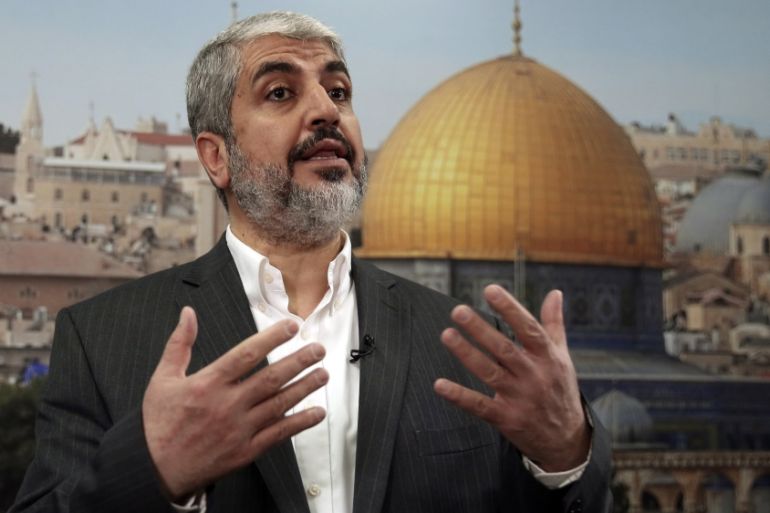The mistakes of Hamas and the need for recalibration
Nobody dares to claim that Hamas doesn’t have the full right to pursue its political agenda.

Much had happened in the last decade of Hamas’ rule in Gaza. The unexpected stunning victory of the 2006 parliamentary elections in the West Bank and the Gaza Strip, followed by futile political disputes between the two rivals Fatah and Hamas, led to a devastating rift among the Palestinians resulting in two governments.
This was shadowed by the strangling inhumane blockade, culminating in Israel’s three “genocidal wars” on the dilapidated enclave, and coinciding with the Arab Spring and the waves of turmoil that swept across the Middle East.
Keep reading
list of 4 itemsMapping Israel-Lebanon cross-border attacks
Eid Mubarak: Hear greetings in different languages
When is Eid al-Fitr 2024 and how is it celebrated?
Fatal mistakes
In such a turbulent, uncertain political arena, precarious and wonky choices would undoubtedly lead to disastrous consequences.
Originally founded as a resistance movement, orchestrating the armed battle against the occupation, Hamas has committed five inexcusable – though inevitable – fatal mistakes in the past 10 years.
Nobody dares to claim that Hamas – a key player in the Palestinian political spectrum – doesn’t have the full right to pursue its political agenda.
However, in 2006, Hamas voluntarily took the bait when it vigorously participated in the parliamentary elections. Nonetheless, its overwhelming landslide victory was an irrefutable black eye for Washington’s attempt to “tame the shrew”.
OPINION: Gaza’s ‘jihadists’ can no longer be dismissed
Hamas’ involvement in the so-called democratic process strikes many as a profound irony. On the one hand, Hamas doesn’t endorse the Palestine Liberation Organization’s (PLO) political programme (PDF), and on the other hand it doesn’t recognise the Middle East Quartet’s conditions, which are the prerequisite for the international recognition of Hamas.
Hamas was literally cornered and the international community bleakly imposed collective punishment measures to make it kneel. Both Hamas and the Gazans were sanctioned. The movement, however, should have expected that and worked on an emergency plan.
Isolated and ostracised
Unfortunately, Hamas made its second strategic mistake when the Islamic movement’s armed wing, the Qassam Brigades, incarnated an imaginary telephone call of a fighter jokingly saying “Hello Condoleezza Rice. You have to deal with me now, there is no Abu Mazen any more.”
The fighter said that while sitting on the chair of the Palestinian President Mahmoud Abbas, in his office in Gaza, immediately after Hamas took full control of the enclave.
Conjuring up the repercussions of the Egyptian revolution on the Palestinian cause, Hamas perpetrated an incurable blunder by squandering the extraordinary opportunity to reconcile with Fatah when the now ousted President of Egypt, Mohamed Morsi, was still in power.
The Palestinian president immediately sacked the Prime Minister Ismail Haniya. Washington fully supported Abbas’ decision, the European Union suspended humanitarian aid to the Gaza Strip and Hamas was entirely sequestered and ostracised.
One shouldn’t forget that the conspiracy against Hamas was colossal, and it was utterly obvious that Hamas was pushed hastily to resolve the political conflict with military means.
It has to choose between its programme of resistance and the daily demands of being an actual governor of the enclave. It desperately tried to balance, but things got worse owing to the uninterrupted consecutive wars that drained the people of Gaza and devastated the already shattered economy.
![Palestinian President Mahmoud Abbas, right, with Hamas leader Khaled Meshaal arriving before their meeting in Egypt, November 2011. [EPA]](/wp-content/uploads/2013/01/2013195337636580_20.jpeg)
After each aggression, the Palestinians rose from the ashes with historic symbolic victory over Israel’s brutality, seeking a visionary leadership, one with a clear-cut strategy to realise their aspirations of liberation and divorce the deceptive “two-prison” solution.
Hamas fails to play that role mainly because of its third considered fault of unequivocal reluctance to direct negotiations with Israel.
No direct talks with Israel
Peace talks with Israel used to be the main point of disagreement between Hamas and the PLO. Hamas sharply rebuked the Palestinian Authority for engaging in endless fruitless rounds of negotiations with Israel. However, when the basic rights of the Gazans are at stake, strategies that used to be almost taboos should become feasible.
Hamas directly negotiated with Israelis to snatch the rights of Palestinian detainees. Thus, with such a precedent, it would be politically prudent for Hamas to at least manoeuvre by waving the proximity of a dramatic change in its untouchable stances.
OPINION: Why the West and Israel should talk to Hamas
This is particularly important when considering the current milieu of unfair and biased mediators, antagonistic countries in the neighbourhood that are cosy with Israel and hostile to Gazans, and the uncooperative, obstinate attitude of the PA.
Conjuring up the repercussions of the Egyptian revolution on the Palestinian cause, Hamas perpetrated its fourth incurable blunder by squandering the extraordinary opportunity to reconcile with Fatah when the now ousted President of Egypt, Mohamed Morsi, was still in power.

The momentum of the Arab Spring and ascending moral influence of the Islamic movement placed it in a position of strength to impose its conditions and drag Abbas to a satisfactory deal.
Hopefully Hamas will avoid making its fifth mistake that would be wasting a settlement with Abbas in the pending meeting in Doha soon.
In the light of an alleged secret Arab plan to overthrow Abbas and replace him with the controversial protege Muhammad Dahlan – backed by Egypt, the UAE, and Israel – Hamas would face unprecedented challenges that may lead to catastrophic consequences, not only for the Islamic movement but also on the Palestinian cause.
Ahmed al-Burai is a lecturer at Istanbul Aydin University. He worked with BBC World Service Trust and the LA Times in Gaza. He is currently based in Istanbul and mainly interested in Middle East issues.
The views expressed in this article are the authors’ own and do not necessarily reflect Al Jazeera’s editorial policy.
